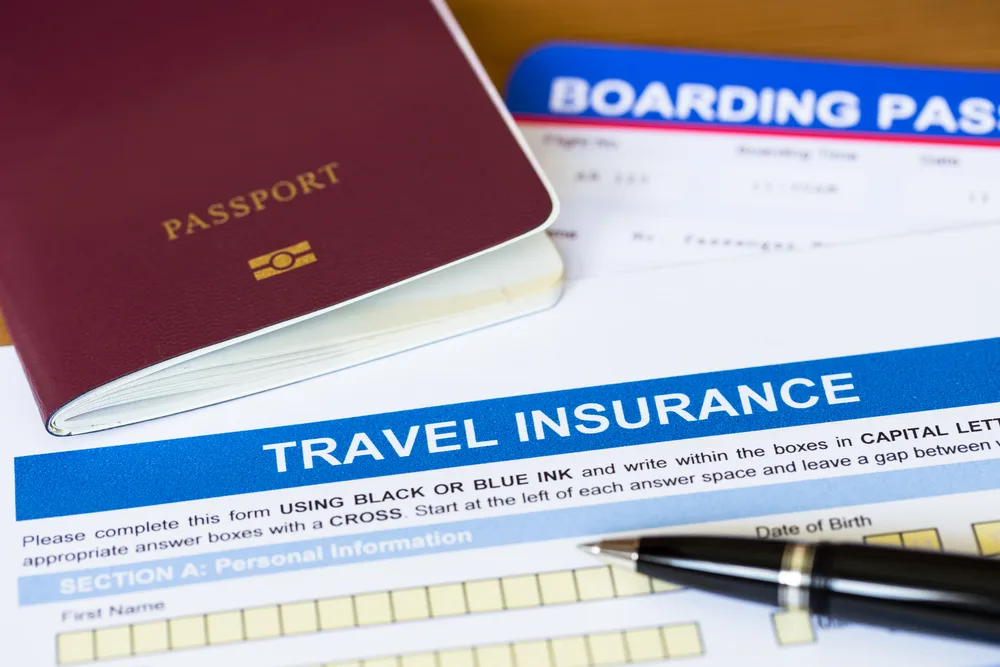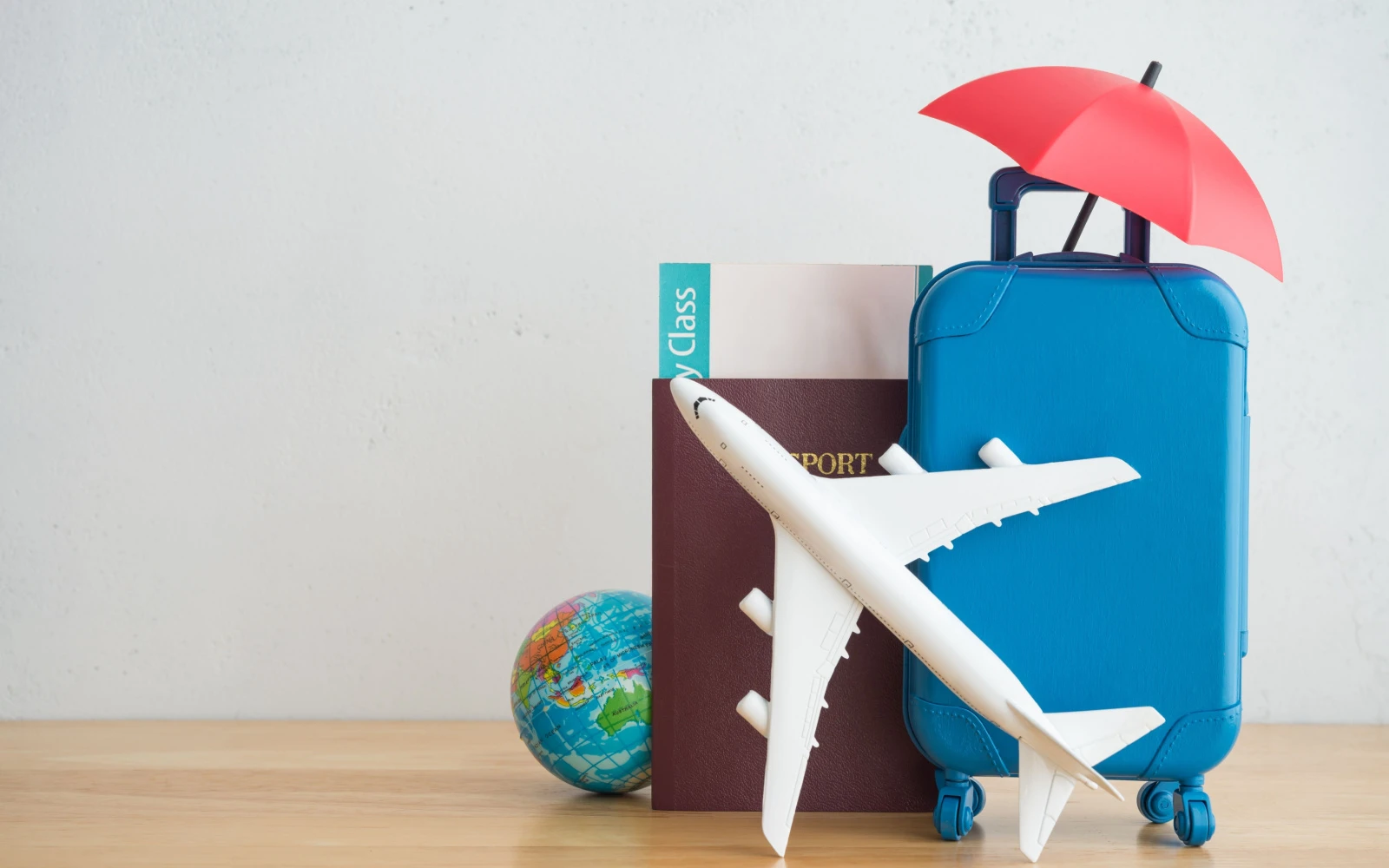“What is travel insurance and do I actually need it?” Curious travelers might wonder if travel insurance is truly essential or just a bonus.
It all depends on the nature of your trip, but for most people, travel insurance is a handy form of protection for trips away from home. Learn what travel insurance is, what it covers, the benefits, and when you might need it in our complete guide.
What Is Travel Insurance?
Travel insurance is a type of insurance that protects travelers against financial losses incurred as a result of unexpected events during their trip. It can cover a wide range of expenses, including medical bills, trip cancellation, lost luggage, and flight delays.
Why is travel insurance important?
There are many reasons why travel insurance is important.
- First, it can protect you from unexpected medical expenses. Even if you have health insurance at home, it may not cover you when you travel abroad. Travel insurance can help you pay for medical bills, including hospitalization, surgery, and prescription drugs.
- Second, travel insurance can protect you from trip cancellation costs. If you have to cancel your trip for an unforeseen reason, such as illness or job loss, travel insurance can reimburse you for the non-refundable portion of your trip cost.
- Third, travel insurance can protect you from lost luggage and other travel inconveniences. If your luggage is lost or stolen, travel insurance can help you replace it. Travel insurance can also cover expenses incurred as a result of flight delays, such as hotel and meal costs.
Just like you insure your car, your home, and your health, growing numbers of people are choosing to insure their travel plans by getting coverage for any potential issues that can arise away from home.
Benefits of Travel Insurance

People Image Studio/Shutterstock
Travel insurance, whether you’re purchasing trip protection, medical, or comprehensive plans, is hugely beneficial for most travelers. If anything goes wrong before or during your trip, you’ll be able to recoup the cost and get any medical attention you need.
There are tons of benefits offered by travel insurance. Here’s a look at what you can expect a travel insurance plan to do for you while you’re away from home.
Covers Cancellations and Trip Interruptions
Life happens! Travel insurance protects you in those unforeseen events that suddenly bring a scheduled (nonrefundable) trip to a grinding halt.
With the right coverage, you’ll be reimbursed if you need to cancel before your departure date due to an unexpected event, illness, injury, or family emergency.
If you successfully depart for your trip and something serious forces you to terminate your trip early, trip interruption insurance will reimburse you for the unused portions of the trip and cover your last-minute flight home.
Helpful for Trip Delays
If your trip is suddenly delayed by inclement weather delaying your flight or mechanical failure on the way to your destination, travel insurance is a Godsend.
Trip delay coverage will help fill in the gaps by covering unused prepaid trip costs you miss due to the delay. You may also get a daily dollar amount for expenses incurred during your delay – usually $150-$200/day.
Pays for Medical Expenses on Your Trip
When the unexpected happens while you’re traveling, insurance will step in to cover your medical expenses and fees. Emergency medical services, doctors visits, prescriptions, and evacuations are typically covered so you won’t be left high and dry.
Coverage and deductible amounts vary, but arriving with travel medical insurance means you won’t need to pay high out-of-pocket expenses if medical emergencies happen while you’re traveling.
Covers Lost and Delayed Baggage
If you’re a seasoned traveler, you’re no stranger to lost and delayed baggage – and the major baggage it saddles your vacation with. Your travel insurance can help foot the bill and reduce the headache by covering your lost, stolen, missing, damaged, or delayed baggage.
Reimbursement amounts vary, but baggage coverage averages are around $200+ per person, per day during your trip for delayed or missing baggage.
Insures Nonrefundable Reservations
Prepaid, nonrefundable reservations can be a little scary to make, especially if there are a lot of moving parts around your planned trip. Travel insurance provides you a way to get a partial or full refund on prepaid, nonrefundable trip costs.
This opens up more affordable reservation options for you, since refundable reservations tend to be markedly more expensive than nonrefundable options.
Accessible, Affordable Plans
Travel insurance is popular because you can tailor your coverage to suit your travel needs and get a plan for an affordable price that won’t drain your bank account.
Cheap travel insurance plans can be purchased in the $100 range, or around 4% of the total trip cost, with coverage for events like unexpected cancellation and baggage delays.
That’s a small price to pay when you consider how much you’d lose if you needed to cancel, interrupt, or delay a prepaid, nonrefundable trip. More expensive, comprehensive plans offer better coverage and may be around 11% of the total trip cost.
Gives You Peace of Mind for Travel
Travel insurance, above all, offers the benefit of giving you peace of mind for your upcoming trip. The sense that every contingency has been planned for and covered will start your trip off on the most optimistic note!
You won’t have to worry about unexpected weather and flight delays, missing baggage, medical emergency costs, or ending your trip early due to an emergency. That peace of mind might help you relax and enjoy your stay that much more.
The 3 Types of Travel Insurance

Casper1774 Studio/Shutterstock
There are 3 basic types of travel insurance plans available: Trip protection, travel medical, and comprehensive travel insurance. Let’s look at these types of travel insurance, how they’re different, and what they generally include.
1. Trip Protection Insurance
- Includes trip cancellation, interruption, and CFAR plans
- Covers trip cancellation or interruption for unforeseen reasons
- Covers up to 200% of prepaid, nonrefundable reservations
Trip protection insurance covers you for unexpected, unforeseen events that suddenly derail your nonrefundable vacation or trip plans.
If you’re booking a flight, hotel, cruise, or other reservation and prepaying in full, this type of coverage gives you full protection in the event of an unexpected event that prevents you from taking or finishing your trip.
Within the trip protection umbrella, there are 3 subtypes of insurance coverage you can purchase: Trip cancellation, trip interruption, and Cancel For Any Reason (CFAR) plans.
Trip cancellation insurance covers you if you suddenly need to cancel prepaid, nonrefundable travel reservations for unforeseeable reasons – things you couldn’t have anticipated at the time you booked.
If you book a trip to Paris and land in the hospital with appendicitis days before your departure date, a trip cancellation plan would 100% refund the prepaid costs of your trip.
Trip interruption insurance covers you if you’re on a trip and an unexpected event cuts it short (like an injury or family death or accident).
Trip interruption insurance covers 100% to 200% of the unused portion of your stay, return flight, and the new last-minute flight you’ll schedule to return home.
Cancel For Any Reason (CFAR) insurance is usually offered as an add-on plan and provides the broadest range of cancellation coverage. Most people get CFAR insurance in addition to trip cancellation, interruption, or travel medical insurance.
You can cancel with this type of travel insurance even if the reason is not “unforeseen,” as most travel insurance plans require.
If you’re closely watching the weather for an upcoming ski resort or beach trip, CFAR insurance gives you the freedom to cancel your prepaid trip as late as 2 days before departure.
But the amount you’ll be refunded with CFAR travel insurance is much less than trip cancellation and trip interruption. Most plans offer 50% to 75% refunds of the total prepaid cost. It’s the price you pay for a little more flexibility.
2. Travel Medical Insurance
- Covers emergency medical services during your stay
- Usually covers hospitalization, doctors visits, and prescriptions
- Available as a standalone policy if needed
Travel medical insurance is different from trip protection insurance, but is sometimes offered along with it as part of a comprehensive travel insurance plan.
You can purchase standalone travel medical insurance for a cheaper price if your trip is refundable or you already have trip protection insurance through your travel credit card.
Travel medical insurance is meant to cover unexpected, emergency medical events during your trip. Slips and falls, sickness, medical evacuation, accidental death and dismemberment, and 24-hour medical assistance are covered with these policies.
You can expect travel medical insurance to cover you in the event you (or another covered person on the trip) needs hospitalization, doctors visits, or prescriptions while away from home.
3. Comprehensive Travel Insurance
- Offers trip protection and travel medical coverage
- Bundled multi-category coverage for one (higher) price
- Best option if you don’t get travel insurance via travel credit card
Comprehensive travel insurance is trip protection insurance and travel medical insurance rolled into a single, comprehensive plan. This option is ideal for those who don’t get any type of travel insurance through a travel credit card.
Coverage is broad with comprehensive travel insurance and it covers all the bases. Trip cancellation, emergency medical services and evacuation, accidental death and dismemberment, travel delay, and baggage delay are typically covered.
Comprehensive travel insurance plans usually cover 75% to 100% of the total trip costs once you’ve paid your deductible. Since they include broad coverage that smaller policies don’t, these types of travel insurance plans are more expensive upfront.
How Does Travel Insurance Work?

Kaspars Grinvalds/Shutterstock
You not only want to know “What is travel insurance?” but also how these plans and policies work. What can you expect if you need to use your travel insurance coverage?
The claim filing process usually looks like this:
- You file a claim via phone, online form, or app
- You submit requested documentation and proof of loss
- Your travel insurance company reviews your claim
- Your claim is approved and paid or denied
Travel insurance, like other forms of insurance, kicks in when you file a claim (online, app, or phone) under your current policy. You’ll need to submit some form of proof of your loss or reason for cancellation.
Your travel insurance provider will let you know exactly what type of proof and documentation is needed. Once the claim is approved, your insurance provider will start working on your claim and gathering any additional needed info.
They may need your hospital, airfare, cruise, hotel, or rental car receipts and information to start processing your claim. Statements from the airline or cruise line may be needed if the reason for cancellation or insurance claim stems from their policy.
Your insurance provider may give you options for how you receive your upfront expenses, daily fixed payment amounts for certain types of coverage, or reimbursement money.
You can typically choose to receive a direct deposit into your bank account or a physical check delivered by mail. Unless your plan states otherwise, you must file your claim within 90 days of the covered incident, which travel insurance companies call the “timely filing limit.”
Most people file travel insurance claims right away, so this 90-day period won’t be a factor in most cases. If you wait too long to file, your claim could be denied outright. So don’t delay to file a claim!
Do You Need Travel Insurance?

Virrage Images/Shutterstock
If you’re purchasing nonrefundable tickets or reservations for any type of travel, travel insurance is absolutely essential. Without it, you’ll have to eat any nonrefundable costs in the event of an emergency or unforeseen.
Aside from covering trip cancellations, delays, and issues with baggage, travel insurance will ensure you’re covered in the event of medical emergencies or if you need to suddenly cut your trip short.
If you’re purchasing refundable travel reservations or tickets, it’s not as necessary, but it can still be a smart purchase. That’s because travel insurance covers more than just unexpected cancellations and trip delays.
Even if you’re buying refundable plane tickets, cruise packages, or hotel stays, those refund policies won’t cover you in the event of a medical emergency while you’re there – but travel insurance will.
And while refundable tickets may honor “unforeseeable” conditions that lead to cancellations or delays, other reasons you might need to cancel or postpone your trip won’t be covered.
For cases like these, add-on Cancel For Any Reason insurance is perfect. You’ll have the flexibility to cancel as late as 2 days before your planned departure.
You don’t have to go all-out and get the most comprehensive, full-coverage travel insurance plan out there (though it’s not a bad idea). A relatively cheap, basic to mid-tier coverage plan should be more than enough for most people’s needs.
Better coverage is a must if you’re spending a lot on your trip, bringing valuables along, or want comprehensive trip protection and medical coverage.
How Much Does Travel Insurance Cost?
Generally, travel insurance costs somewhere between 4% and 10% of your total trip cost – usually at least $100. Cheaper plans offer less coverage while more expensive plans offer comprehensive, multi-category coverage.
Travel insurance can be very cheap or represent a good chunk of your total trip expense. It all depends on the type of coverage you want and a few personal factors, like your age and pre-existing medical conditions.
Let’s look at 2 general examples to get an idea of how much travel insurance might cost for you.
- If your cruise, rental car, and airfare totals $4,500 and you get a cheap travel insurance plan (around 4% of the cost), you might pay $180 for travel insurance coverage.
- If you’re taking a 2-week trip abroad and your total costs are $10,000, you’ll probably want full, comprehensive coverage. Using the 11% figure, you might pay $1,100 for travel insurance on this trip.
If the cost of travel insurance seems too high, consider the alternative – covering the full trip expenses, medical expenses, unused nights due to trip delays, or lost baggage expenses out of pocket. With this in mind, the cost of travel insurance seems small by comparison.
Frequently Asked Questions

qoppi/Shutterstock
Travel insurance needs to be demystified – it’s such a helpful tool to protect your wallet when you’re planning any kind of trip. Check out the most frequently asked questions on travel insurance to learn more.
How much is travel insurance?
You can expect to pay somewhere between 4% and 10% of the total cost of your trip for travel insurance. Your coverage amount, age, and more will factor into the cost. Most people pay $100+ for travel insurance plans.
Do you need travel insurance to travel?
Travel insurance may be required for entry to Anguilla, Antarctica, Argentina, Bahamas, Belize, Bermuda, Chile, Cuba, Curacao, Ecuador (Galápagos Islands only), Fiji, Indonesia, Iran, Israel, Jamaica, Jordan, Laos, Nepal, and Oman.
The list continues with Panama, Philippines, Qatar, Russia, Rwanda, Saudi Arabia, Schengen countries, Seychelles, Singapore, St. Maarten, Sri Lanka, Thailand, Turkey, Ukraine, United Arab Emirates, and Vietnam requiring some form of travel insurance for entry.
What insurance is best for traveling?
There are hundreds, if not thousands, of travel insurance providers to choose from. Many offer similar plans and coverage for comparable costs. Look for plans that suit your plans, covering only what you need.
You might only need travel medical insurance if you're buying refundable travel tickets. If you get trip protection insurance via your travel credit card, you might only need a standalone Cancel For Any Reason plan or basic medical plan.
Can I get a full refund with travel insurance?
Yes, you can get a full, 100% refund (or more) with certain travel insurance plans. Trip protection/cancellation plans, trip interruption plans, and full comprehensive travel insurance plans may offer 100% to 200% refunds depending on the circumstances.
What events will travel insurance not cover?
Travel insurance may not cover you if accidents or theft occurs while you're intoxicated or if you're engaging in "high-risk" activities without the proper policy.
You may not get coverage if you have a medical emergency due to pre-existing conditions that were not outlined in the policy, or if a "foreseeable" event leads to cancellation or delays.
So, What Is Travel Insurance – Essential or Extra?
When it comes down to it, weighing the potential cost of something going wrong before or during your trip is enough to convince most people that travel insurance is much more than an optional “extra.”
Truly – no one wants to get stuck paying for unexpected events, delays, and emergencies out of pocket!
Travel insurance is essential and gives you peace of mind for your travels, no matter where you’re heading. With a good policy in place, you’ll be able to relax knowing you’re covered if any rain falls on your parade away from home.



